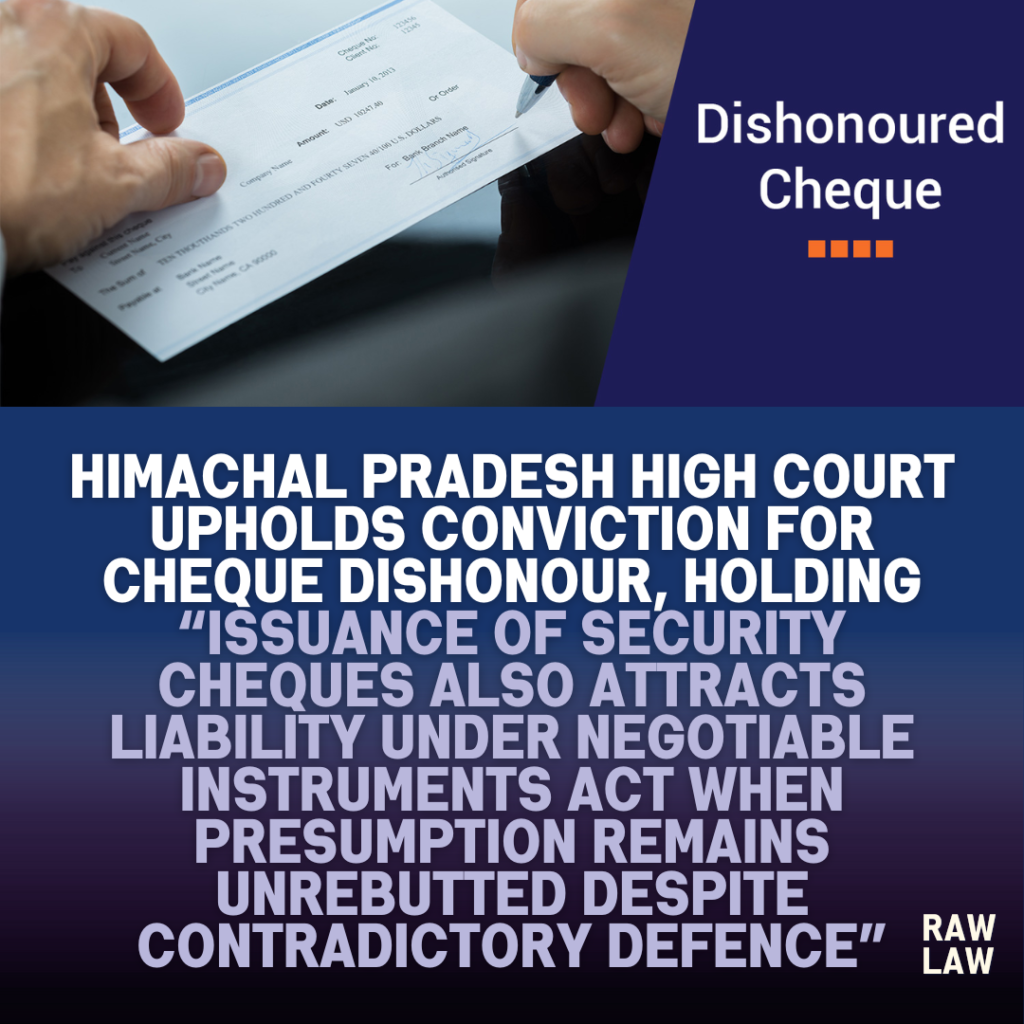Court’s Decision
The Himachal Pradesh High Court dismissed the criminal revision and upheld the conviction and sentence imposed on the petitioner under Section 138 of the Negotiable Instruments Act. The Court held that issuance of a cheque, even if claimed as security, attracts liability under the NI Act if dishonoured for insufficiency of funds, and the accused failed to rebut the statutory presumption of legal liability.
Facts
The complainant, an orchardist, sold apple boxes worth ₹1,72,000 to the accused, who issued a post-dated cheque towards payment. The cheque was dishonoured due to “insufficient funds”. Despite service of statutory notice, the accused failed to pay the amount. The complainant filed a complaint under Section 138 of the NI Act. The Trial Court convicted the accused, sentencing him to one year of simple imprisonment and payment of ₹3,44,000 as compensation. The Appellate Court upheld the conviction. The accused filed a revision, claiming the cheque was issued only as security, and that he was not allowed to pluck apples, so the security cheque was misused.
Issues
- Whether a cheque issued as security but dishonoured for insufficiency of funds attracts liability under Section 138 of the NI Act.
- Whether the presumption under Sections 118 and 139 of the NI Act can be rebutted by the accused’s contradictory claims regarding the nature of the cheque.
- Whether revisional jurisdiction under Section 397 CrPC permits interference with concurrent findings of conviction in cheque dishonour cases.
Petitioner’s Arguments
The petitioner argued that:
- The cheque was issued as security for the purchase of apples but was misused as he was not allowed to pluck the apples.
- The complainant failed to produce goods receipts, casting doubt on the transaction.
- The signatures and contents on the cheque were filled with different pens, indicating tampering.
- The findings of the lower courts were based on conjecture and not sustainable.
Respondent’s Arguments
The complainant argued:
- The issuance of the cheque and the petitioner’s signature were admitted.
- The statutory presumption under Sections 118 and 139 NI Act applied.
- The petitioner failed to rebut the presumption with cogent evidence and took contradictory stands on the cheque being security for crop purchase versus loan repayment.
Analysis of the Law
The Court analysed:
- Section 138, 118, and 139 of the NI Act, establishing statutory presumptions of consideration and liability upon cheque issuance.
- A cheque issued as security, when dishonoured, still attracts Section 138 if liability is established.
- The accused’s admission of signature on the cheque shifts the burden to rebut the presumption, which requires more than a mere plausible explanation and must be proven by preponderance of probabilities.
Precedent Analysis
The Court relied on:
- Malkeet Singh Gill v. State of Chhattisgarh (2022) 8 SCC 204: Revisional court cannot reappreciate evidence unless findings are perverse.
- Naresh Verma v. Narinder Chauhan 2020(1) Shim. L.C. 398 and Hiten P. Dalal v. Bratindranath Banerjee (2001) 6 SCC 16: Once signature is admitted, the presumption of legal liability under Section 139 arises.
- Rangappa v. Sri Mohan (2010) 11 SCC 441 and Bir Singh v. Mukesh Kumar (2019) 4 SCC 197: Presumption under Section 139 applies even if the cheque was signed blank and handed over voluntarily.
- Uttam Ram v. Devinder Singh Hudan (2019) 10 SCC 287: Complainant need not prove debt beyond the statutory presumption.
- Kumar Exports v. Sharma Carpets (2009) 2 SCC 513: Bare denial by the accused is insufficient to rebut statutory presumption.
Court’s Reasoning
The Court held:
- The issuance and signature on the cheque were admitted by the accused, activating the presumption under Section 139.
- The accused provided contradictory defences (security for crop purchase vs. security for a loan), which failed to rebut the presumption.
- Lack of goods receipts was irrelevant in light of the statutory presumption and the complainant’s testimony.
- The revisional court’s jurisdiction is limited to rectifying patent errors, not re-evaluating evidence or substituting factual findings of lower courts absent perversity.
Conclusion
The High Court found no illegality or perversity in the findings of the Trial and Appellate Courts and dismissed the revision, maintaining the conviction and sentence under Section 138 NI Act.
Implications
- Clarifies that security cheques can attract liability under Section 138 upon dishonour.
- Reinforces that the statutory presumption under Sections 118 and 139 NI Act is strong and shifts the burden on the accused to rebut it with substantive evidence.
- Limits the revisional jurisdiction in cheque dishonour cases to correcting jurisdictional or legal errors, not reappreciating evidence.
Referred Cases and Their Relevance
- Malkeet Singh Gill (2022): Limits revisional jurisdiction.
- Naresh Verma, Hiten P. Dalal, Rangappa, Bir Singh: Clarify presumption under Sections 118 and 139.
- Uttam Ram: Statutory presumption overcomes minor discrepancies.
- Kumar Exports: Bare denial insufficient to rebut presumption.
FAQs
1. Can a cheque issued as security attract criminal liability under the NI Act?
Yes, if the cheque is dishonoured due to insufficient funds, Section 138 applies, even for security cheques.
2. Is the complainant required to prove the transaction in detail in cheque bounce cases?
No, once the cheque issuance and signature are admitted, the statutory presumption applies, shifting the burden to the accused to rebut.
3. Can the High Court re-examine evidence in revision against a cheque dishonour conviction?
No, unless there is a jurisdictional error or perversity, revisional jurisdiction cannot be used to reappreciate evidence.
